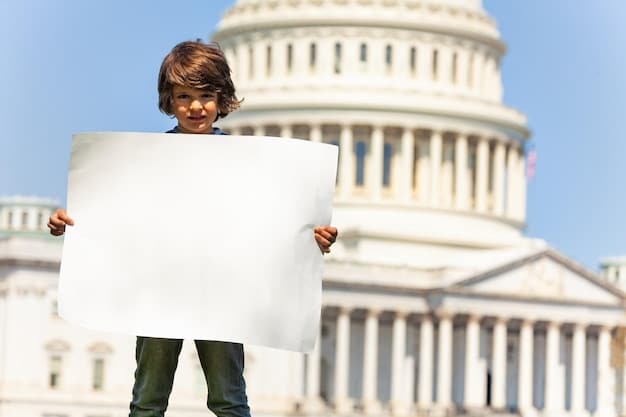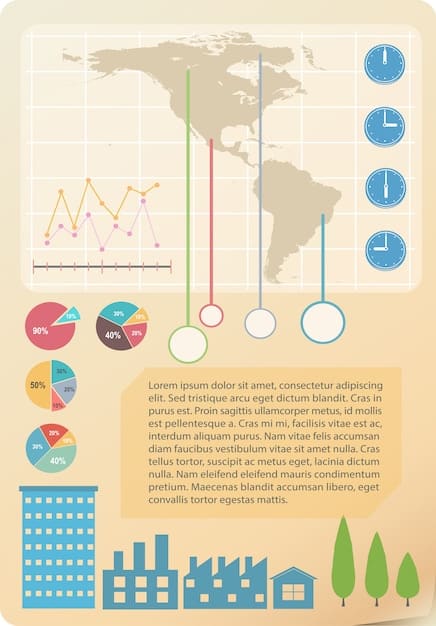Effective Advocacy: US Citizens Driving Humanitarian Aid Policy Changes

US citizens can effectively advocate for humanitarian aid policy changes through informed engagement with elected officials, supporting advocacy organizations, amplifying marginalized voices, participating in public discourse, and holding policymakers accountable for their decisions.
How can US citizens truly make a difference in the world, particularly when it comes to humanitarian aid? The answer lies in effective advocacy. This article explores how can US citizens effectively advocate for humanitarian aid policy changes, providing practical steps and strategies for making your voice heard and driving meaningful change.
Understanding Humanitarian Aid and Its Importance
Humanitarian aid is assistance provided to people in distress, aimed at alleviating suffering and preserving human dignity. It’s crucial for responding to crises, supporting long-term development, and promoting global stability. But how is humanitarian aid policy made, and where do US citizens fit in?
The US government plays a significant role in providing humanitarian aid globally, influencing policy and allocating resources through various agencies and programs. Understanding this landscape is the first step in becoming an effective advocate.
The Role of US Humanitarian Aid
The US is one of the largest providers of humanitarian assistance in the world. This aid is delivered through a variety of channels, including:
- USAID (United States Agency for International Development): The lead federal agency for international development and humanitarian assistance.
- State Department’s Bureau of Population, Refugees, and Migration (PRM): Focuses on protecting vulnerable populations, including refugees and migrants.
- International organizations: Partnering with the UN, Red Cross, and other NGOs to deliver aid effectively.
Understanding these key players and their roles is essential for targeting your advocacy efforts effectively.
The Impact of Humanitarian Aid
Humanitarian aid has a profound impact on the lives of millions around the world, providing:
- Emergency Relief: Responding to natural disasters, conflicts, and other crises with food, water, shelter, and medical care.
- Long-Term Development: Supporting sustainable development initiatives, such as education, healthcare, and economic empowerment.
- Protection of Vulnerable Populations: Protecting the rights and dignity of refugees, internally displaced persons, and other vulnerable groups.
Advocating for effective humanitarian aid policies ensures that these critical services continue to reach those who need them most.
In essence, grasping the fundamentals of humanitarian aid, its significance, and the US’s involvement sets the stage for informed and impactful advocacy. It allows citizens to pinpoint areas where policy changes can lead to more effective and equitable aid distribution and assistance.
Identifying Key Policy Issues
To be an effective advocate, it’s vital to identify specific policy issues that need attention. This involves staying informed about current events, understanding the complexities of humanitarian crises, and researching potential solutions. What are some pressing issues in humanitarian aid policy today?
Focusing your advocacy efforts on specific, well-defined issues will make your voice more impactful and increase your chances of success.

Current Challenges in Humanitarian Aid
Several challenges currently hinder the effectiveness of humanitarian aid, including:
Funding Shortfalls: Insufficient resources to meet the growing demand for humanitarian assistance.
- Access Constraints: Difficulties reaching people in need due to conflict, insecurity, or bureaucratic obstacles.
- Coordination Issues: Lack of effective coordination among aid organizations, leading to duplication and inefficiencies.
- Accountability Concerns: Ensuring that aid reaches the intended beneficiaries and is used effectively.
Areas for Policy Improvement
Addressing these challenges requires policy changes in several key areas, such as:
- Increased Funding: Advocating for greater investment in humanitarian aid programs.
- Improved Access: Supporting policies that promote safe and unimpeded access for aid workers.
- Enhanced Coordination: Encouraging greater collaboration and information sharing among aid organizations.
- Strengthened Accountability: Promoting transparency and accountability in aid delivery.
By focusing on these key areas, US citizens can play a crucial role in shaping more effective and responsive humanitarian aid policies.
Identifying specific policy issues, understanding current challenges, and pinpointing areas for improvement are crucial steps in effective advocacy. This knowledge empowers citizens to direct their efforts toward meaningful changes that can improve the lives of those in need.
Engaging with Elected Officials
One of the most direct ways to advocate for policy changes is to engage with your elected officials. This involves contacting them, attending town hall meetings, and participating in campaigns. How can you effectively communicate your concerns and influence their decisions?
Building relationships with your representatives and making your voice heard are essential for shaping policy outcomes.
Contacting Your Representatives
Reaching out to your elected officials is easier than you might think. Consider these strategies:
- Phone Calls: Calling their offices to express your views on specific issues.
- Emails and Letters: Writing personalized emails or letters outlining your concerns and proposed solutions.
- Social Media: Engaging with them on social media platforms to raise awareness and spark discussion.
Remember to be polite, respectful, and factual in your communications.
Attending Town Hall Meetings
Town hall meetings provide an opportunity to engage with your representatives in person. Use these events to:
- Ask Questions: Inquire about their positions on humanitarian aid and related policies.
- Share Your Story: Share personal experiences or stories that highlight the importance of humanitarian aid.
- Network: Connect with other concerned citizens and build a stronger advocacy network.
Preparing thoughtful questions and presenting your views respectfully can make a significant impact.
Effectively engaging with elected officials is a cornerstone of advocacy. By using varied methods to communicate, attending public forums, and contributing to campaigns, US citizens can directly influence policymakers and advocate for more effective humanitarian aid policies. This engagement ensures that the voices of concerned citizens are heard and considered in the decision-making process.
Supporting Advocacy Organizations
Many organizations are dedicated to advocating for humanitarian aid and related policies. Supporting these groups can amplify your voice and increase your impact. What are some effective ways to support advocacy organizations?
By partnering with established advocacy groups, you can leverage their expertise, resources, and networks to achieve greater policy changes.

Identifying Reputable Organizations
When choosing an advocacy organization to support, consider the following factors:
- Mission and Goals: Ensure that their mission aligns with your values and priorities.
- Track Record: Research their past accomplishments and effectiveness.
- Transparency and Accountability: Look for organizations that are transparent about their finances and operations.
Some reputable organizations working on humanitarian aid include Oxfam America, CARE, and the International Rescue Committee.
Ways to Support Their Work
There are many ways to support advocacy organizations, including:
Financial Donations: Contributing to their fundraising efforts.
- Volunteer Work: Offering your time and skills to support their programs.
- Awareness Raising: Spreading their message through social media, events, and other channels.
- Advocacy Campaigns: Participating in their campaigns to influence policymakers.
Your support can help these organizations to continue their vital work and achieve meaningful policy changes.
Supporting advocacy organizations multiplies the impact of individual efforts. By carefully selecting organizations, contributing resources, and actively participating in campaigns, citizens can strengthen the collective voice advocating for humanitarian aid and ensure that these organizations can continue to champion effective policies.
Amplifying Marginalized Voices
Humanitarian crises often disproportionately affect marginalized communities. Advocating for these communities and ensuring that their voices are heard is crucial. How can you amplify marginalized voices in the context of humanitarian aid policy?
By promoting inclusivity and centering the experiences of those most affected by crises, you can help to create more equitable and effective policies.
Understanding Disproportionate Impacts
Marginalized communities often face greater risks and vulnerabilities during humanitarian crises due to factors such as:
- Poverty: Limited resources to cope with disasters and conflicts.
- Discrimination: Exclusion from access to services and opportunities.
- Lack of Representation: Insufficient voice in decision-making processes.
Recognizing these disproportionate impacts is essential for developing targeted and effective advocacy strategies.
Strategies for Amplification
There are several ways to amplify marginalized voices, including:
- Centering Their Stories: Sharing their experiences and perspectives through storytelling and media outreach.
- Supporting Their Organizations: Partnering with community-based organizations that represent marginalized groups.
- Advocating for Inclusive Policies: Promoting policies that address the specific needs and vulnerabilities of marginalized communities.
By actively listening to and elevating marginalized voices, you can help to shape more inclusive and equitable humanitarian aid policies.
Elevating marginalized voices is paramount in humanitarian aid advocacy. By understanding the unique challenges faced by these communities and actively working to amplify their stories and needs, US citizens can help shape humanitarian aid policies that are truly equitable and effective.
Participating in Public Discourse
Engaging in public discourse is essential for raising awareness and shaping public opinion on humanitarian aid policy. This involves writing letters to the editor, participating in online forums, and organizing community events. How can you effectively contribute to public conversations about humanitarian aid?
By sharing your knowledge, perspectives, and experiences, you can help to educate others and inspire action.
Writing Letters to the Editor
Letters to the editor are a powerful way to express your views and influence public opinion. When writing a letter, remember to:
- Be Concise: Keep your letter short and focused on a specific issue.
- Be Informative: Provide factual information and evidence to support your claims.
- Be Persuasive: Use compelling arguments to convince readers to support your position.
Submitting your letter to local and national newspapers can reach a wide audience and spark meaningful conversations.
Organizing Community Events
Community events can raise awareness and mobilize support for humanitarian aid policy changes. Consider organizing:
- Educational Forums: Hosting events where experts and advocates can share information and perspectives.
- Fundraisers: Organizing events to raise money for humanitarian aid organizations.
- Advocacy Rallies: Holding rallies to demonstrate public support for policy changes.
By engaging your community in these activities, you can create a powerful movement for change.
Actively engaging in public discourse is critical for shaping opinions and driving action on humanitarian aid policies. By contributing to media outlets, participating in online discussions, and organizing community activities, US citizens can significantly influence public sentiment and foster a more informed and engaged society.
Holding Policymakers Accountable
Ultimately, the effectiveness of advocacy efforts depends on holding policymakers accountable for their decisions. This involves monitoring their actions, tracking their voting records, and advocating for transparency and accountability. How can you effectively hold policymakers accountable for their stances on humanitarian aid?
By staying informed, engaging in oversight, and demanding transparency, you can help to ensure that policymakers are responsive to the needs of vulnerable populations.
Monitoring Their Actions
Staying informed about your elected officials’ actions is crucial. This can be achieved by:
- Following Their Voting Records: Tracking how they vote on key humanitarian aid bills and resolutions.
- Monitoring Their Public Statements: Paying attention to their speeches, interviews, and social media posts on related issues.
- Attending Public Hearings: Participating in or observing hearings on humanitarian aid policy.
Advocating for Transparency
Transparency is essential for accountability. Advocate for policies that promote:
- Open Government: Access to information about government decision-making processes.
- Ethical Conduct: Standards of conduct that prevent conflicts of interest and corruption.
- Independent Oversight: Mechanisms for monitoring and evaluating the effectiveness of humanitarian aid programs.
By demanding transparency and holding policymakers to high ethical standards, you can help to ensure that humanitarian aid is delivered effectively and ethically.
Holding policymakers accountable is the final, crucial step in effective advocacy. By monitoring actions, demanding transparency, and advocating for ethical conduct, US citizens can ensure that policymakers prioritize humanitarian aid and are responsive to the needs of vulnerable populations.
| Key Point | Brief Description |
|---|---|
| 📣 Engage Officials | Contact representatives via calls, emails, and town halls. |
| 🤝 Support Organizations | Donate, volunteer, and promote reputable humanitarian aid groups. |
| 🗣️ Amplify Voices | Center stories & support marginalized communities. |
| 📰 Public Discourse | Write to editors and organize community events. |
Frequently Asked Questions
▼
Humanitarian aid alleviates suffering during crises, provides essential resources like food and medical care, and supports long-term stability in affected regions, saving lives and promoting dignity.
▼
You can contact them by calling their local or Washington D.C. office, sending emails or letters, and engaging with them on social media platforms. Town hall meetings are also opportunities.
▼
Reputable organizations include Oxfam America, CARE, the International Rescue Committee, and Doctors Without Borders. Research their missions and financial transparency before supporting them.
▼
Share their stories, support community-based organizations that represent them, and advocate for policies that address their specific needs and vulnerabilities during humanitarian crises.
▼
Holding policymakers accountable ensures they prioritize humanitarian aid, act ethically, and remain responsive to the needs of vulnerable populations affected by crises around the world.
Conclusion
In conclusion, how can US citizens effectively advocate for humanitarian aid policy changes? It starts with understanding the issues, engaging with elected officials, supporting advocacy organizations, amplifying marginalized voices, participating in public discourse, and holding policymakers accountable. By taking these steps, US citizens can make a real difference in the lives of those affected by humanitarian crises around the world.





